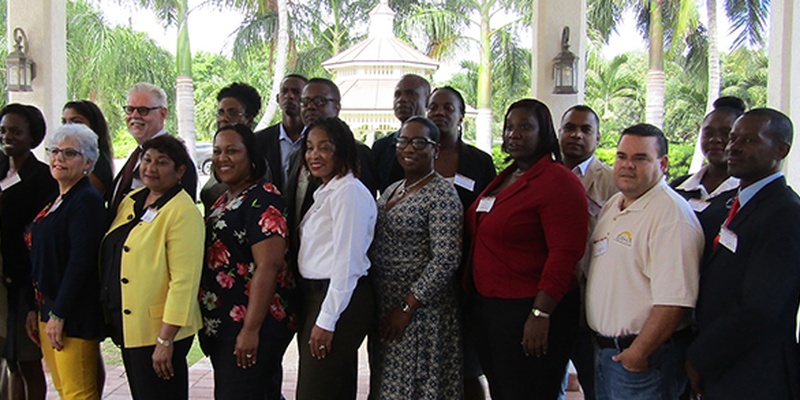Plant health is important for Caribbean tourism declares Minister at the IPPC Regional Workshop for the Caribbean
Posted on mer, 25 Sep 2019, 12:54

Participants at the 2019 Regional Workshop for the Caribbean. © FAO
12 September 2019, Antigua and Barbuda – The 2019 International Plant Protection Convention (IPPC) Regional Workshop for the Caribbean took place from 10 to 12 September 2019. Representatives from the following 12 Caribbean countries attended the workshop: Antigua and Barbuda, Bahamas, Belize, Dominica, Grenada, Guyana, Haiti, Jamaica, St Kitts and Nevis, St Lucia, St Vincent and the Grenadines and Trinidad and Tobago.
In his opening remarks, the Honorable Dean JONAS, the Antigua and Barbuda Minister of Agriculture, Fisheries and Barbuda Affairs, highlighted the importance of plant health for the Caribbean’s vital tourism sector. For example, the region’s beautiful tropical flora helps attract tourists.
The Minister also noted that three pests - Lethal Yellowing, Citrus Greening and the Giant African Snail - were of great concern to Antigua and Barbuda. He also noted that the seminar on Banana Fusarium Wilt tropical race 4 (TR4), scheduled for the day after the workshop, would help Caribbean countries establish prevention activities and prepare contingency plans.
Draft Standards and a draft Commission on Phytosanitary Measures (CPM) Recommendation were reviewed and regional comments were formulated, discussed and agreed upon. Participants also:
-
discussed regional priorities for the IPPC Strategic Framework (2020-2030);
-
planned activities in the Caribbean region for the International Year of Plant Health (IYPH) 2020;
-
identified ways to improve national reports related to IPPC obligations;
-
formulated ideas for the next Call for Topics; and
-
discussed how to become more involved in the ePhyto Solution and the issuance of electronic phytosanitary certificates.
Seminar on Banana Fusarium Wilt -TR4
A one-day seminar on Banana Fusarium Wilt -TR4 was held immediately after the IPPC Regional Workshop. Mr Luis PEREZ-VICENTE, a plant pathologist and Banana Fusarium Wilt specialist from the Plant Health Research Institute (INISAV) of Cuba, provided an overview of TR4 and the current status of its spread. He emphasized how deadly this disease was and how it could wipe out all banana varieties and affect their production. Furthermore, once introduced, this pest can remain dormant in the soil for decades. Several country representatives, as well as industry representatives, discussed the situation in their countries.
Participants reviewed their state of preparedness and discussed their next steps. They also committed themselves to sharing information and preparing prevention and contingency plans.

From left to right: Lethal Yellowing / Giant African Snail / Citrus Greening. © Kishma Primus

